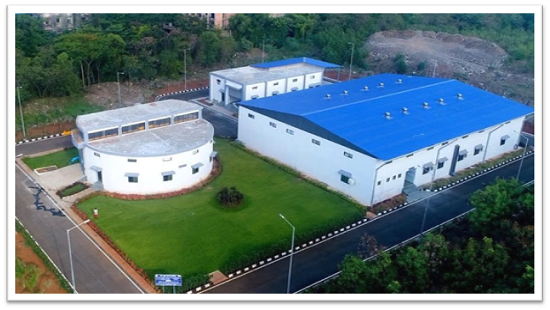
Navi Mumbai Emerges as India’s Water Conservation Leader at the 6th National Water Awards 2024
When Indian cities make headlines, the stories often revolve around pollution, floods, or infrastructure gaps. Rarely does a city rise to national attention for its success in sustainability and resource management. Navi Mumbai, however, has rewritten that narrative. The Navi Mumbai Municipal Corporation (NMMC) has achieved first rank in the country in the Local Self-Government category of the 6th National Water Awards 2024, organized by the Ministry of Jal Shakti.
The recognition, to be conferred by the President of India on November 18 in New Delhi, is not just an accolade, it is a reflection of how systematic planning, data-driven decision-making, and citizen participation can combine to create a resilient, water-secure city. At a time when India’s urban centers are facing growing water scarcity, Navi Mumbai’s achievement stands as a model of forward-thinking governance.
The National Context: A Crisis in Slow Motion
India’s water challenge is vast and complex. According to NITI Aayog’s Composite Water Management Index, nearly 600 million Indians face high to extreme water stress, and more than 20 cities, including Delhi, Bengaluru, and Chennai, could run out of groundwater within the next decade. Rapid urbanization, aging infrastructure, and erratic rainfall have strained urban utilities beyond capacity.
The Ministry of Jal Shakti’s National Water Awards were instituted to recognize innovation and best practices across states, districts, industries, and local bodies. In the 2024 edition, 751 proposals were received from across the country. Each was evaluated by the Central Water Commission and the Central Ground Water Board through field inspections and a rigorous score-based assessment. Navi Mumbai’s first-place ranking reflects excellence in sustainable water management, governance transparency, and public engagement.
The NMMC Framework: From Efficiency to Empowerment
NMMC’s success rests on a robust, data-driven approach to managing its water ecosystem. The corporation has steadily transformed its infrastructure over the past decade, emphasizing efficiency, reuse, and accountability. Three pillars define this transformation.
First, technology. NMMC has implemented smart water monitoring systems that track flow and pressure in real time across its seven administrative zones. This has reduced non-revenue water losses, caused by leaks and unauthorized connections, by an estimated 12 percent between 2020 and 2023. GIS-based mapping ensures that leakages are detected faster and repairs are executed within hours, minimizing water loss.
Second, recycling and reuse. Navi Mumbai operates one of the most efficient sewage treatment and water reuse systems in the country, with a combined capacity of more than 350 million litres per day. Roughly 35 percent of this treated water is recycled for industrial, landscaping, and construction use. This approach has helped reduce the pressure on fresh water resources while promoting circular use within the city’s ecosystem.
Third, community engagement. NMMC’s public awareness initiatives, such as the Jal Sanrakshan Abhiyan and school-level water clubs, have built civic responsibility among residents. Dr. Kailas Shinde, NMMC Commissioner and Administrator, credited this achievement to the collective participation of citizens. His statement highlighted an important truth: water management is as much about social awareness as it is about infrastructure.
Maharashtra’s Urban Sustainability Success Story
Maharashtra has historically struggled with extremes of drought and flooding. In this context, Navi Mumbai’s recognition is a bright spot. The city’s planned layout, strong civic infrastructure, and governance efficiency have allowed it to adopt innovations that many larger cities find difficult to implement. The Chief Minister of Maharashtra congratulated the NMMC team, calling the achievement a “benchmark in local self-governance.”
Union Jal Shakti Minister C. R. Patil, who announced the results, emphasized that the awards aim to make water literacy a mainstream idea, just like financial literacy. His remarks underline a policy shift from mere water delivery to water stewardship, where citizens and institutions alike share responsibility for conservation.
Building a Water-Resilient Future
The Ministry of Jal Shakti’s broader vision of a “Jal Samruddh Bharat” or Water Prosperous India depends on models like Navi Mumbai. The corporation’s work demonstrates that sustainable urban development is achievable when local governance aligns with national policy and citizen behaviour. Its key initiatives, automated metering, rainwater harvesting mandates, stormwater reuse, and groundwater recharge, reflect a pragmatic balance of innovation and discipline.
Yet, this recognition comes with new challenges. Navi Mumbai’s population, currently at around 1.6 million, is projected to exceed two million by 2030, driven by industrial expansion and the upcoming international airport. Water demand, already close to 390 million litres per day, will inevitably rise. To sustain its performance, NMMC is exploring desalination technology, expanding rainwater harvesting coverage, and upgrading its treatment facilities to meet Class A reuse standards.
A Model for Urban India
Navi Mumbai’s success offers a valuable lesson in how local bodies can transform from service providers into sustainability leaders. Urban governance in India has often been reactive, addressing crises rather than anticipating them. NMMC’s proactive and data-led approach breaks that pattern, proving that efficiency, transparency, and public participation can coexist within the framework of local administration.
The city’s journey also underscores the importance of institutional continuity. Policy consistency, long-term investment, and community ownership have been central to NMMC’s progress. While technology provides precision, it is governance that ensures impact.
The Larger Message
Navi Mumbai’s triumph in the National Water Awards 2024 is more than a victory for one city. It symbolizes a broader shift in India’s urban mindset, from short-term fixes to sustainable systems. In a country where water crises often dominate headlines, Navi Mumbai’s quiet success story offers hope that thoughtful planning and collective effort can reverse the trend.
If India’s cities are to thrive in the decades ahead, they must follow Navi Mumbai’s lead: treating water not as a resource to be consumed, but as a legacy to be conserved. Because the real measure of progress in the 21st century will not be how much water we use, but how wisely we manage every drop.





